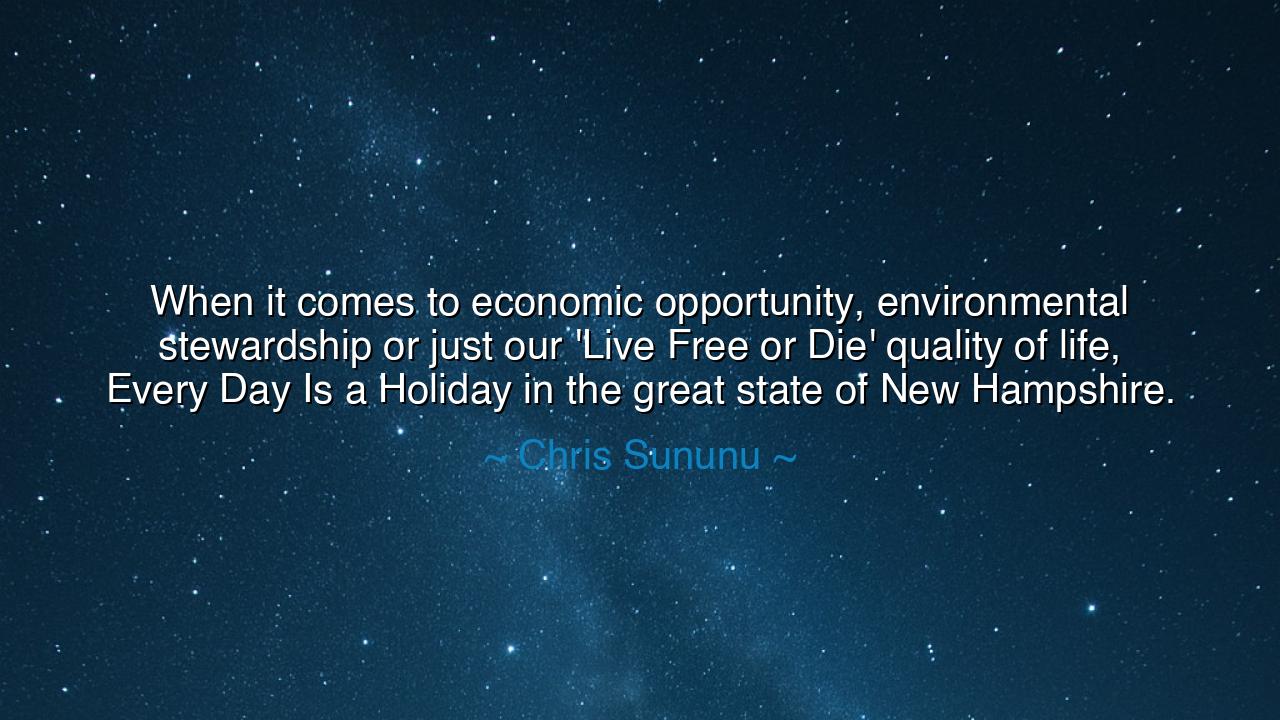
When it comes to economic opportunity, environmental stewardship
When it comes to economic opportunity, environmental stewardship or just our 'Live Free or Die' quality of life, Every Day Is a Holiday in the great state of New Hampshire.






In the councils of old, when banners were stitched with hands and hopes, leaders spoke not in spreadsheets but in symbols. Thus when Chris Sununu proclaims that “when it comes to economic opportunity, environmental stewardship or just our ‘Live Free or Die’ quality of life, Every Day Is a Holiday in the great state of New Hampshire,” he calls his people to remember a civic liturgy: work that is meaningful, land that is tended, freedom that is cherished, and a daily gratitude large enough to feel like festival. The saying gathers policy into poetry and turns the ordinary calendar of a state into a hymn of belonging.
Hear the threefold chord within it. First, economic opportunity—not greed, but doors flung open so talent can find its task. Second, environmental stewardship—the ancient vow that those who drink from a well must also keep it clear. Third, the motto “Live Free or Die,” the stern north wind that fills the sails of Yankee independence. Twined together, they make a creed of place: prosperity with conscience, liberty with duty, celebration with restraint. In such a creed, a weekday can feel like a holy day because one’s labor fits one’s land and one’s laws fit one’s soul.
This spirit has an origin older than any present governor. In 1809, New Hampshire’s Revolutionary War hero John Stark, too ill to attend a veterans’ reunion, sent a toast by letter: “Live free or die; Death is not the worst of evils.” His words, later adopted as the state motto in 1945, were not mere bravado but a compact: that freedom is costly, and yet worth the cost. The phrase still rings through the granite hills and on the license plates that roam them, a reminder that the state’s identity is an inheritance of courage and constraint.
Consider a story that threads the line between work and wild. In the shadow of the White Mountains, a small family shop once stood at the edge of a river trail. The owners poured coffee at dawn for trail crews and skiers, then spent evenings cleaning the path and planting saplings after spring floods. They prospered because the forest prospered; tourists came for the clarity of water and stayed for the clarity of welcome. This is environmental stewardship as daily ritual: not a slogan, but the quiet labor that keeps a valley green and a ledger black. In such a place, a Tuesday can feel like a feast—Every Day Is a Holiday—because neighbors keep one another’s futures bright.
Yet Sununu’s boast is more than sentiment; it is a wager that liberty and responsibility can live in one house. Economic opportunity without the guardrails of care will strip a hillside bare; stewardship without the dynamism of enterprise will leave young hands idle. The wisdom of the elders therefore binds the two: let enterprise pay for the bridges it pounds, and let conservation make room for honest craft. Where this balance holds, a state does not merely avoid decline; it ripens. Its children learn that profit and pasture need not be enemies, and that a free people can choose limits as an act of love.
So too with the stern clarity of “Live Free or Die.” The motto is not permission to ignore one another; it is a summons to stand upright and stand together. Freedom at its best enlarges the circle of care: it invites the maker to innovate, the farmer to husband the soil, the hiker to pack out what she packed in, the selectboard to keep taxes low and streams clean. When liberty is yoked to neighborliness, the commonwealth becomes a festival of small excellences—porches repaired, trails maintained, apprentices trained, rivers watched like family.
From this saying, draw a simple law for communities anywhere, not only in New Hampshire: treat your place as a guest of honor every day. Build rules that unleash builders and still leave the hawk a limb to land on. Let schools teach craft and civics side by side. Keep budgets tidy and waters clearer still. If you do these things, a workday will taste of celebration—not because nothing is hard, but because what is hard is shared, and what is shared is meaningful.
And now, practical counsel, as plain as a trail sign: (1) For citizens—buy from those who mend and maintain; volunteer once a month where your boots touch earth. (2) For businesses—measure success by wages and waters alike; invest in efficiency before expansion. (3) For leaders—cut red tape that stifles honest trade, and tie firm knots around the protections that keep wild places wild. (4) For all—carry the motto in your manners: be free enough to act, wise enough to refrain, grateful enough to give back. Do this, and the boast becomes true—Every Day Is a Holiday—because each day bears the gifts of opportunity, stewardship, and freedom in a measure fit for the long joy of a people.






AAdministratorAdministrator
Welcome, honored guests. Please leave a comment, we will respond soon